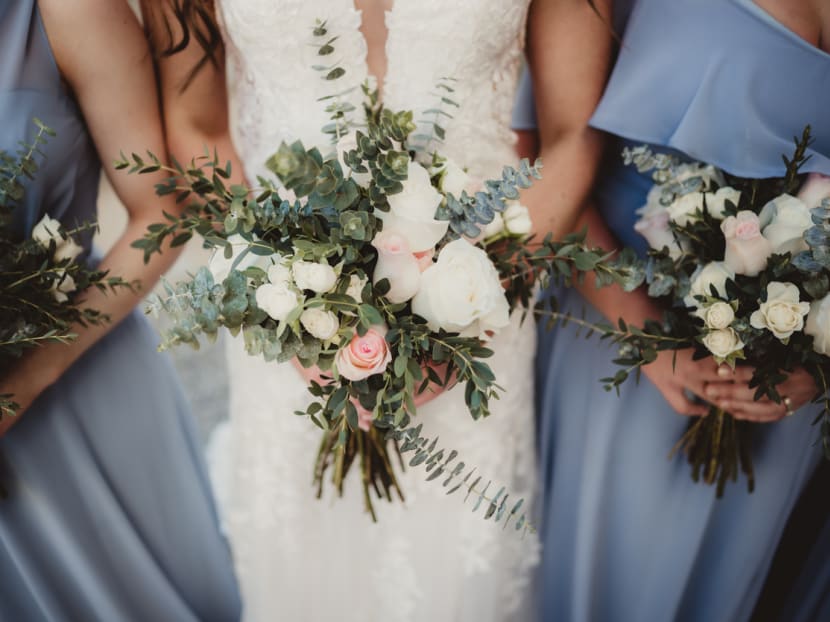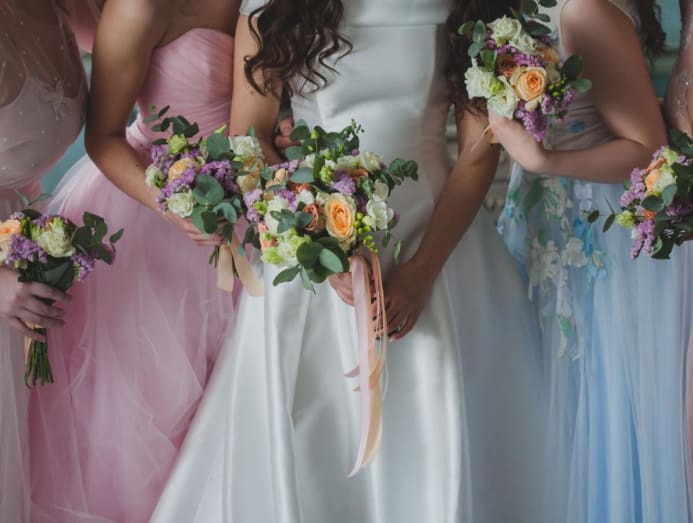‘We’re not speaking anymore’: The over-the-top weddings that have ruined friendships
A couple getting married is a joyous occasion but sometimes, over-the-top weddings can create problems for their bridesmaids and groomsmen, especially when the wedding plans are burdensome.

Wedding planners said that tensions and misunderstandings can be avoided if bridal couples and the team carrying out duties for the wedding communicate openly from the start. (Photo: iStock)

This audio is generated by an AI tool.
When one of Ms Chen's closest friends of over a decade got engaged and asked her to be a bridesmaid for her wedding, she was thrilled to accept what she saw as a duty given to a trusted friend and "to uphold their bond".
What she did not anticipate was that the role would consume much of her year and strain their friendship such that they were no longer on speaking terms after the wedding.
Ms Chen, who is in her 20s and works in the public sector, wanted to be known only by her last name, because she did not want to further strain her relations with the married couple or embarrass them publicly.
She recounted that during the preparations when she had spare pockets of time, she would hunt for bridesmaids' dress options, help with door gifts or go to vendor appointments on her own.
There was so much for her to do, even though there were six bridesmaids in the bridal party and the couple's extended family members were also involved in the planning.
"Everything in my life revolved around the wedding," Ms Chen said, describing her state of mind as "jumpy" in the months leading up to the event.
The most stressful part of it all was the Indian wedding dance tradition known as "sangeet", which evolved in complexity as the occasion drew near. By the time the special day came around, it had become a 30-minute dance performance.
"The dances were massive, so you're looking at 20 to 30 people for each dance," she recalled.
"There were about six to eight dances for the whole performance. There were many transitions and so many other things to take note of – that was the frustrating part."
Ms Chen added that what was initially promised to be a few days of rehearsal extended to nearly a week of dance sessions, with each lasting for one to two hours.
On top of that, as the bride's vision of the big day kept changing, what was initially intended to be a S$100 bridesmaid dress, to be fully paid by the bride, eventually became a three-piece outfit costing S$400, which the bridesmaids had to pay for themselves.
Wedding planners told CNA TODAY that more young couples in Singapore are choosing to forgo the bells and whistles and arranging small, simple ceremonies.
Wedding stylist Karen Lee said that 50 to 60 per cent of the weddings she is handling these days do not include the gatecrashing tradition, because the couples want their friends to have fun "instead of running around".
Gatecrashing is a Chinese wedding tradition in Singapore, in which the groom and his groomsmen must complete a series of challenges set by the bridesmaids before he is allowed to see the bride.
However, there are still couples who are bucking this minimalist trend and splashing out on lavish ceremonies for their big day.
Stories of these over-the-top weddings occasionally pop up online, with bridesmaids and groomsmen airing horror stories of the lengths they were expected to go to when they agreed to help out with their friends' weddings.
In some extreme cases, these weddings even led to the end of the friendships.

AT THE COUPLE'S BECK AND CALL
Ms Nina Hashim, who has been a bridesmaid five times, still vividly recalls the first time she was tasked with wedding preparation work, which left her physically exhausted.
The 24-year-old, who works in sales and marketing, said that the bride was understandably stressed because the wedding was being planned at the last minute in 2022, at a time when Singapore was emerging from the COVID-19 pandemic, so she relied heavily on Ms Nina for support.
On the wedding day, Ms Nina was primarily responsible for collecting props, dresses and wedding favours, often arranging private transport or hiring a moving company for larger items.
"I didn't have time to eat at all. I had to run around (during the wedding) with my heels on," she said.
"I ensured the cake arrived on time, that the driver was there and the dulang hantaran were on time, making sure everything was perfect."
Dulang hantaran are decorative trays used in Malay weddings to present gifts between the bride and groom's families as part of the engagement or solemnisation ceremony.
As exhausted as she was by the end of that busy day, she felt relief as well, because it signalled the end of a three-month ordeal that involved non-stop wedding planning.
"Sometimes, she would expect me to be on the phone 24 hours a day," Ms Nina said, adding that she often received calls from her friend at 3am to talk about the wedding plans.
"The first two times (it happened), I closed an eye, but afterwards, I told her it's a bit unreasonable because I'm also studying."
Thankfully, her friend called her at more reasonable times after that.
"I was definitely stressed out and tired from the back-to-back travelling and juggling school work," Ms Nina added, believing that her friend's behaviour was due to wedding-related stress.
Another woman who gave her name as just SM had to prepare the sangeet for an ex-schoolmate's wedding because she had a dance background.
In her late 20s and working in the technology industry, she described her secondary school friend as someone who was not particularly close to her.
She initially agreed to be a bridesmaid because she thought the commitment needed would be reasonable.
Given that the wedding was just two months away, she assumed that the choreography would have been prepared and that she would be responsible for just teaching the bridesmaids the dance and joining in the performance on the wedding day.
To her shock, there was nothing planned and she was expected to "do it from scratch".
That meant that she had to secure a venue so that they could rehearse, pick the right music and manage the training schedules of seven bridesmaids all by herself.
It was a logistical nightmare, she said. Communicating and coordinating with bridesmaids from different social circles was difficult and it was made even more challenging because they had to rehearse during the year-end festive season.
One by one, several bridesmaids dropped out of the performance and what was originally a choreography for seven ultimately became a smaller dance performed by just a handful who were available.
A 30-year-old administrator who wanted to be known as just Penelope said that one experience at a pre-wedding photoshoot left her feeling like she was taken for granted and questioning whether she would ever agree to be a bridesmaid again.
During the photoshoot, she was assigned the role of driving the bridal party around, but when they were in the car, the bride spoke to her only when giving instructions about where to go, making her feel like nothing more than a driver instead of a friend.
Not only that, the bride had "very high expectations of her dreamy, princess-like wedding" and she and the other bridesmaids had to adhere to the bride's "spoken and unspoken wishes", she said.
Although the couple had provided the bridal party with dresses, they were made of organza and the one for Ms Penelope was too loose for her, which made it difficult for her to walk around in it and fulfil her duties.
"I think it's important to consider your friends' dressing preferences instead of forcing everyone to wear the style you like," she added.
STILL FRIENDS AFTER THE WEDDING?
While some friendships are reinforced by a wedding experience, others begin to fracture under the pressure.
For Ms Chen, things came to a head on the wedding day. The bride became fixated on a crease on her silk dress, blaming Ms Chen who had been responsible for ironing it.
"No matter how often I re-ironed it with a steam iron, it was still like that," Ms Chen said. "I didn't know what to do because I'd done my best."
She recalled how she and the other bridesmaids had to keep pacifying the bride as the day went on, while the bride kept finding faults. Among other things, the bride felt that the guests were dressed too informally and she did not like her makeup.
"You realise that there are certain aspects of her personality that you have never seen before and you're not quite sure whether you like it," Ms Chen said.
What was hardest for Ms Chen was that her friend never followed through on a promised thank-you meal. After the wedding, both of them just severed contact with each other.
"It's a waste because of how much effort has gone into our friendship over the past 10 years."
For former bridesmaid SM, witnessing someone she is not close to behaving poorly and feeling stressed during the wedding temporarily influenced her perception of her friend.
"I didn't see great sides of her personality and since I wasn't particularly close to her, it was hard to understand or rationalise that," she said.
The friendship survived the wedding, but it strengthened her resolve to serve as a bridesmaid only for close friends.
"If I'm not close, I'll just say 'no'," she said. "I don't want to offend them, but I know this will change how I see them. I'd rather not risk our friendship over a wedding."
On the other hand, despite Ms Nina's experience as her friend's bridesmaid, their friendship managed to endure.
Her friend eventually acknowledged that she had behaved unreasonably during the wedding and made up for it with several dinners. This was a gesture that, to Ms Nina, made the stress and effort feel worthwhile.
Ms Nina went on to be a bridesmaid four more times after that and has not encountered such a stressful wedding since that first time.

GOOD COMMUNICATION IS KEY
Wedding planners told CNA TODAY that most misunderstandings and much of the tension surrounding wedding planning can be avoided if couples and their organising parties communicate openly from the start.
Ms Denise Cheah, a wedding planner from The Genuine Vows, described being asked to be a bridesmaid or groomsman as "an honour," noting that most people are willing to support their loved ones.
Yet, expectations between the couple and the bridal party can differ. When it comes to financial matters, it may be especially difficult and uncomfortable to discuss.
Ms Cheah said that expenses for items such as outfits and transportation can come to hundreds or thousands of dollars. Bridal party members might expect reimbursement for expenses, while couples may assume that friends will bear these costs.
Besides financial strain, emotional burdens often fall on those executing their duties and they may have to manage difficult guests or last-minute tasks without professional support.
"However, because the bridal party is close to the couple and their families, it can be difficult for them to be assertive without causing tension," Ms Cheah said.
Ms Daniela Erni, a wedding planner from Create Your Story, also emphasised the importance of good communication between the couple and the bridal party to avoid breeding resentment.
It would be best to clarify expectations and assumptions so that everything is clear from the start and no one's feelings are hurt.
One married couple, Mr Bentley Cheng, 27, and Ms Shermine Cheah, 31, said that this was why they made it a priority that their bridal party felt supported and well cared for during their wedding.
Despite hosting a lavish celebration for more than 400 guests, the couple, who work in financial services, ensured that the team carrying out tasks for them was not overly burdened.
Given the size of their wedding, the couple also engaged a wedding planner to help coordinate the event.
"We tried not to let (our friends) do so much work," Mr Cheng said. "We kept their duties as simple as possible because everyone has work commitments."
To help everyone feel at ease before the games for the customary gatecrash, the couple had a dinner with the bridal party to let them get to know each other.
"Our idea was very simple – make sure that both the bridesmaids and the groomsmen bond so that when they play any games, there will not be any hard feelings," he added.
Ms Shermine Cheah, recalling her past experiences as a bridesmaid in which she had to wear uncomfortable dresses, said that she was determined not to impose any attire requirements on her friends for her own nuptials.
"We just told our bridesmaids and groomsmen that we are not going to dictate what they're going to wear for the wedding."
Wedding planners said that couples are more willing nowadays to opt for simple weddings and push back on parents' wishes for bigger affairs.
Ms Lee the wedding stylist said that parents, too, are becoming more "open-minded" and willing to lower their expectations.
"There are many couples I've met who are a lot more vocal and speaking out to their parents, telling them, 'This is what I want'," Ms Lee added, noting that there are brides who would prefer to have just one outfit change and do away with the pageantry normally associated with weddings.
Agreeing, Ms Erni said that there is a growing number of couples prioritising the enjoyment of their guests and bridal party.
"The less you go with the programme, the more you indulge in the flow, the more time you feel you have and the more memories you create," Ms Erni said.
Ms Lee said: "If everyone just saw this as a celebration of love, instead of a transaction, there'd be fewer hurt feelings."








.jpg?itok=CdUmaUmt)






